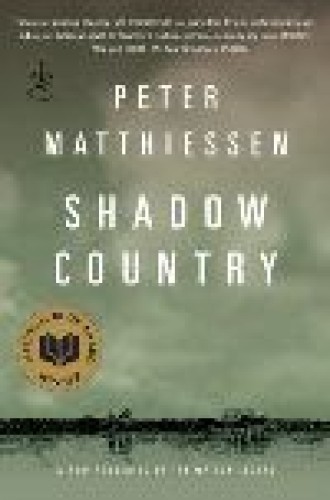Shadow Country
Rarely do you get to use sweeping words like epic and masterpiece and staggering, or to say that a book will be in print in America as long as there is an America, but here I fling these claims around with confidence. Peter Matthiessen’s immense novel of early Florida and violence, of race and Americanness is one of the great American novels.
Isn’t that a lovely phrase to be using about the work of a writer who is alive and well?
Shadow Country has everything—greed, courage, guns, lust, lies, grace, water, money, mosquitoes, muddled motives, and the swirling, endless confusion of skin colors that is perhaps the most basic American story. The book is based on a true story—the life and times of Edgar Watson, a farmer, dreamer and murderer on the Gulf Coast at the birth of the 20th century—which somehow lends it extra depth and verve: while Matthiessen weaves his tale from every angle and in many voices (including, in the final third of the book, that of Watson himself), the story’s ultimate veracity gives it a root and bone that makes its fictional potency all the more true.
Odd, isn’t it, that our great fictions are the truest tales of Americans? Asked to find someone to tell of our character and energies, whom would we summon to speak? Mark Twain, William Faulkner, Willa Cather, Saul Bellow, Flannery O’Connor, Scott Fitzgerald, perhaps the late John Updike’s rabbity everyman—and now, at the close of a remarkable writing career, Matthiessen.
Some readers will be familiar with Matthiessen as a superb maker of nonfiction. The Snow Leopard is a classic of spiritual search; his book about Cesar Chavez (Sal Si Puedes) was one of the first to seriously consider Chavez’s devout Christianity; and among his many books of nature writing is the terrific The Tree Where Man Was Born, about human origins in Africa. But he has said himself that he is first and foremost a novelist, and with Shadow Country, which earned him, at age 81, his second National Book Award, Matthiessen caps a career already remarkable for range and reach.
It’s an unusual book in various ways. First, it appeared originally as three stand-alone novels (Killing Mister Wat son, Lost Man’s River and Bone by Bone), but, as Matthiessen explains in a prefatory note, he had always wanted to remake the three into his original vision for the saga, and he finally did so by essentially rewriting them into a single volume. This caused a ripple of controversy when Shadow Country was nominated for awards—is it merely a masterful editing job or actually a new book? (My answer: Who cares?)
Matthiessen opens the book with an incident that many other writers would have saved for the conclusion: Watson is gunned down on a beach by 20 of his neighbors in October 1910. From that moment, frozen in time, the book spins up and away, into braided and woven stories, excuses, explanations, lies, mysteries, prevarications, fulminations, illuminations; dozens of friends and neighbors, wives and children, slaves and lovers and citizens speak, winding their stories around the moment when the feared, respected and terrifying Bloody Watson raised his shotgun and was answered with a fusillade that echoes all the way to the end.
The second part of the book follows Watson’s son Lucius as he tries to unravel his father’s dense mystery, and the third part—the best, I think, and by itself a masterful novel of America from 1855 to 1910—allows Edgar Watson to speak for himself, in the flowing prose of a journal he keeps all his life.
Shadow Country is so big, so sweeping, so braided, that to quote the most searing and soaring passages from it would occupy the next ten pages of this magazine, so I will confine myself to one snippet: Edgar Watson seeing frontier Florida for the first time, in 1871:
Here and there, rounding a bend, the barge surprised brown-skinned people on the banks, crouching back like wildcats caught out in the open. . . . These Creeks were the first wild men I had ever seen. The women and young would rush into the reeds or flee through the shadows of the great live oaks which spread their heavy limbs over the clearings, but the grown men and older boys, drifting out of gun range, would pause at the forest edge to watch the intruders over their shoulders, in the way of deer; I was awed by the stillness in them even when they moved. They were set to run, they had to be. The bargeman told us that bored, drunken travelers would pass the time blazing away at every furred and feathered bit of life along the river, . . . which was why, at the first glint of metal, the wild folk withdrew into the shadows.
Shadows from which very few ever emerged, so thorough was the epic killing of aboriginal Americans.
It will take you a month of mornings on the train to read Shadow Country, but when you’re finished you will close it with amazement. If you are like me, you will wince at the blood and rage and greed and bigotry in which our nation was born, and in which we still simmer, but you will also feel a thrill of pride in the prickly courage and vaulting ambition that have been hallmarks of America from the start—and feel too, perhaps, a wriggle of mad hope that we can finally, at the dawn of the 21st century, find a common coin other than violence and greed. We came, we grabbed, we slaughtered, we got ours; and now what?



